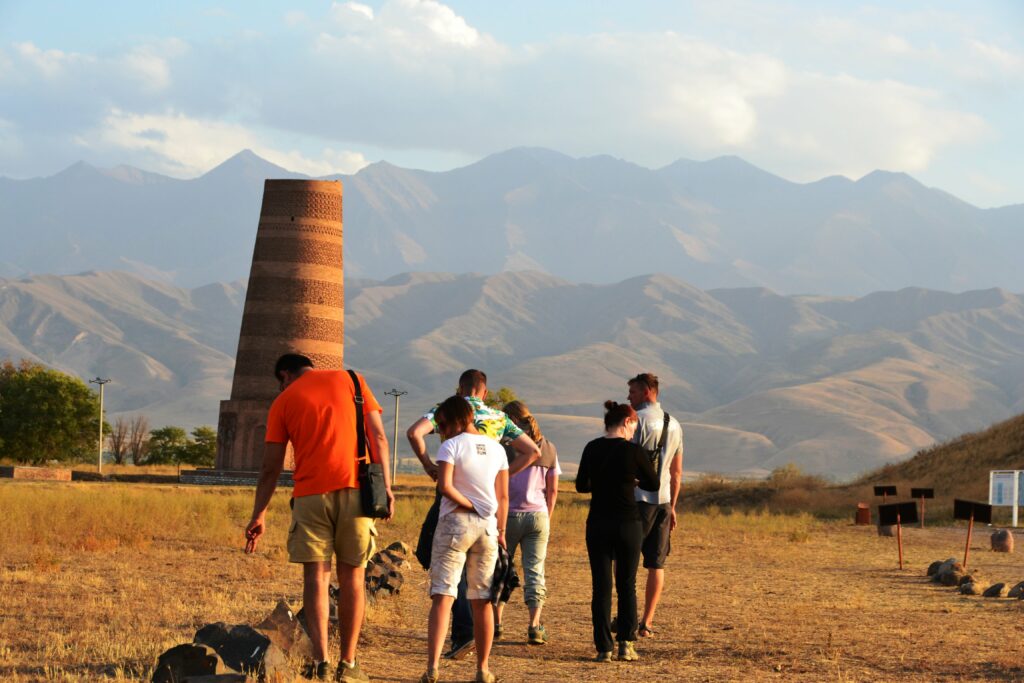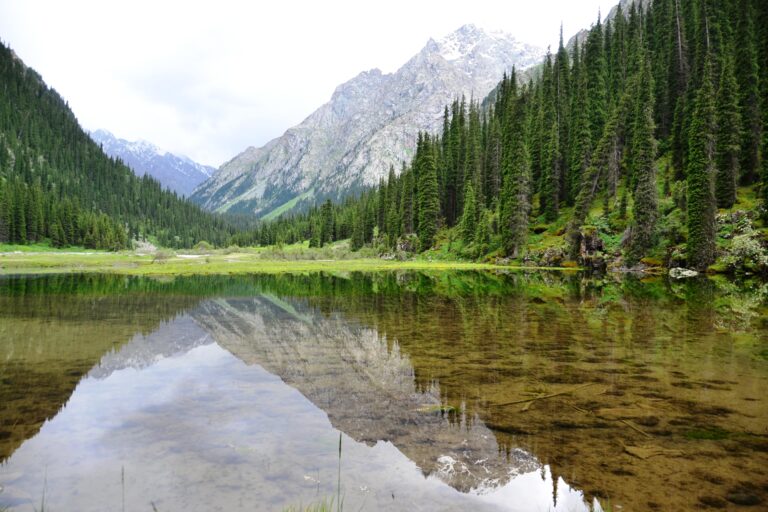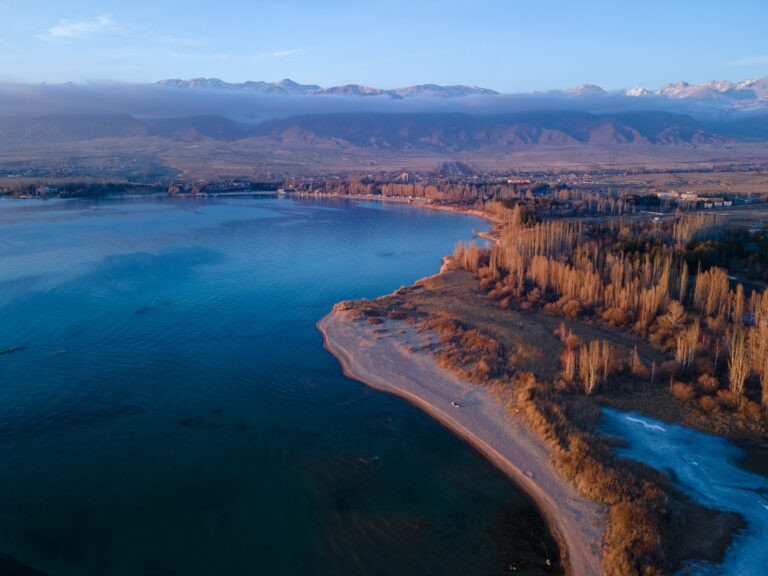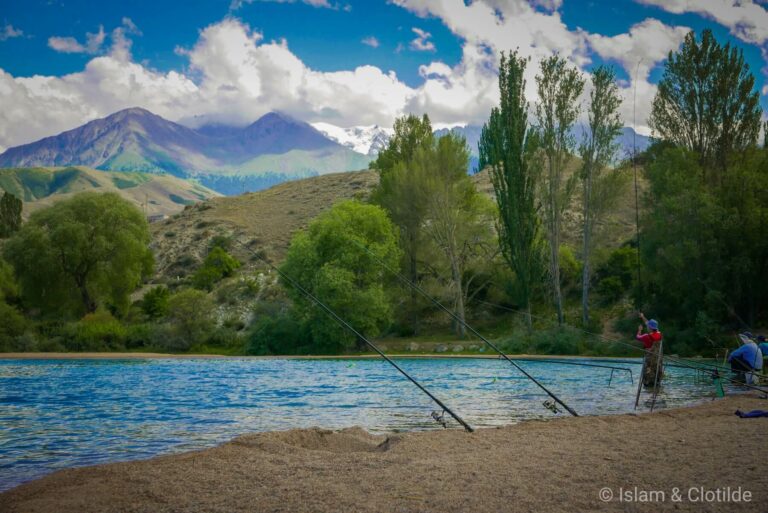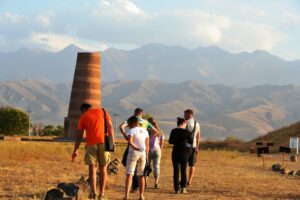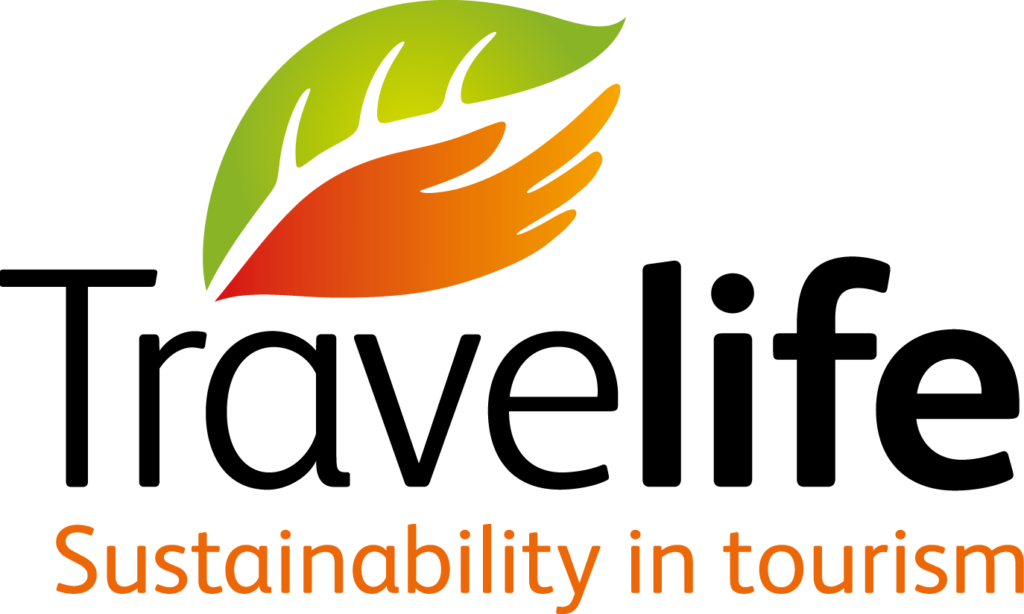Kyrgyzstan (also Kyrgyzstan) is a country in the heart of Eurasia, 85th in the world by area and 117th by population. Kyrgyzstan borders Kazakhstan, China, Uzbekistan, and Tajikistan. Kyrgyzstan is a multinational country, but most of the population is Kyrgyz. In addition to the Kyrgyz, a large number of Uzbeks, Russians, Dungans and Uigurs live here. Kyrgyzstan is a secular state, and among the religions practiced are predominantly Islam (80% of the population) and Christianity (10%).
About the Country
Kyrgyzstan is a country in Central Asia, famous for its majestic mountains, mirror-like lakes, and hospitable people. Having visited Kyrgyzstan once, you will come back to it again and again in your memories, but most likely – you will come back for new impressions.
In the variety of tourist destinations and historical and natural attractions, Kyrgyzstan is unparalleled. Here stretches the Pamir Mountains and “heavenly mountains” of Tien Shan, where ski lovers rush, the clearest alpine lake Issyk-Kul with its sandy beaches welcomes lovers of sunbathing, and relict walnut and pine forests are always ready to hide you from prying eyes.
Historically located at the crossroads of the Great Silk Road, Kyrgyzstan absorbed the whole color of Asia: from everyday nomadic culture to oriental delicacies of cooking, from Buddhist temples and statues to the ancient Orthodox churches. Colorful yurts, kumys, hunting with golden eagles, traditional equestrian competitions, the epic “Manas” and playful improvisations of Akyn poets will not let anyone get bored. All this Kyrgyzstan surprisingly combines with the technology of the 21st century and untouched virgin nature, for which it is so famous. In other words, a real find for the tourist – that’s what Kyrgyzstan is!
Language
The country’s state language is Kyrgyz, and the role of Russian as an official language has also been legislated. In the southern part of Kyrgyzstan, the Uzbek language is also widespread. English is to some extent present only in the capital, but in tourist areas, it is quite possible to explain oneself in English.
Geography and Climate
Kyrgyzstan borders China, Kazakhstan, Uzbekistan, and Tajikistan and is located in a place where the ancient Tien Shan and Pamir mountains meet, which cover almost 90% of the country. Among these mountains, there are 3 peaks over 7,000 meters high, and the average height of the country is about 2,750 meters above sea level.
The country is rich in rushing rivers and mountain lakes, but the most famous lake is Issyk-Kul, one of the largest and deepest lakes on the planet. The highlight of Issyk-Kul is its location between two mountain systems, which allows you to admire the snowy peaks even in summer, sunbathing on the hot sand near the shore. The peculiarity of the lake is also its water – crystal clear, incredibly rich blue color, and slightly salty to the taste, which makes Issyk-Kul a full-fledged analog of the sea.
Most areas of the country belong to areas with a moderately continental and continental climate, the other regions range from a polar climate in the high mountains of the Tien Shan to subtropical in the southwest of the country (Fergana Valley). The amount of precipitation also varies greatly from place to place. The average summer daytime temperature on the plains is 30-32 degrees, but in winter it stays around zero. In the mountainous regions, the temperature is on average 5-10 degrees lower, 20-25 degrees in summer and -10 degrees in winter.
When is the best time to travel to Kyrgyzstan?
The most popular season for traveling to Kyrgyzstan is summer. At this time of year, you can fully appreciate most of the sights that this country offers you: for example, from May to October the weather allows you without any problems to go hiking in inaccessible mountainous areas, where you can enjoy mind-blowing views of natural beauty. This is an ideal time for trekking, hiking, biking, river rafting, paragliding, horseback riding, and much more.
Nice summer season in Kyrgyzstan and the possibility of beach, and resort holidays on the shores of Lake Issyk-Kul. You can alternate relaxing sunbathing by the water with diving, windsurfing, jet skiing, and numerous attractions.
For lovers of alpine skiing and snowboarding is also good in winter. Near the cities of Bishkek and Karakol, there are comfortable ski bases, with pistes of all levels of complexity. And if you are a freeride and backcountry skiing fan or you just want some new sensations, the huge expanses of Kyrgyz mountains can offer you a lot of amazing emotions.
You won’t be bored here during the rest of the year either. For example, in spring, koumissotherapy is very popular, which is often combined with living in a yurt in jailoo, away from civilization. Historical sites, ancient settlements, and gastronomic tours are available at any time of the year, and a large number of geothermal springs, sanatoriums, and famous in the entire CIS medical centers are waiting for those wishing to improve their health regardless of the season.
What do I need to enter Kyrgyzstan?
Kyrgyzstan is the most unbureaucratic country for tourists to visit. Registration of foreign citizens arriving for up to 60 and in some cases up to 90 days is completely abolished here. Visa regimes with 62 countries in Europe, Asia, and America have also been abolished. Residents of EAEU countries (Russia, Kazakhstan, Belarus, and Armenia) can visit Kyrgyzstan with their internal passports. A full list of countries with the visa-free regime is available here.
It is quite easy to get to Kyrgyzstan despite the seeming remoteness of the country. There are regular direct flights to Bishkek from almost all airports in major Russian cities (Moscow, St. Petersburg, Yekaterinburg, Novosibirsk, Irkutsk), as well as from airports in Istanbul (the most popular option for Europeans), Dubai, Urumqi, Delhi and cities in Central Asia. The average ticket price is rarely more than 20 thousand soms ($236), on average, the ticket costs 10-12 thousand soms ($100-150).
Besides air travel, you can also go to Kyrgyzstan by train. Long-distance trains come to Bishkek from many Russian cities, including Moscow. Of course, it is also possible to enter Kyrgyzstan by car through the Kazakh, Uzbek, Tajik, and Chinese borders.
As everywhere else, the COVID-19 pandemic has made its adjustments, and when entering Kyrgyzstan they are as follows: to enter the country, foreign nationals and stateless persons must present the results of a PCR test conducted in the last 72 hours from the time of selection before arrival in the country or a document (certificate) certifying receipt of a vaccine against coronavirus infection COVID-19. This requirement does not apply to children under 5 years of age (inclusive).
Read possible additional requirements and the list of countries allowed for entry at the following link to the website of the Kyrgyz Ministry of Foreign Affairs.
What can I do in Kyrgyzstan?
Kyrgyzstan is an ideal country for a vacation if you are not indifferent to the natural beauty.
Among the inhabitants of the CIS countries, Kyrgyzstan is still popular as a place for resort and recreational activities due to the warm and gentle shores of Lake Issyk-Kul, which is rightly considered the Central Asian sea. The large size of the lake, the clearest water without jellyfish and algae, the warm climate, and amazing natural conditions (the lake is surrounded by mountains on all sides and is 1700 meters above sea level) make this place one of the best options for recreation.
Besides classic beach lovers, Kyrgyzstan also attracts mountain lovers, mountain climbers, rock climbers, hikers, bikers, auto-tourists, etc. The vastness of the Kyrgyz mountains is so great that you can travel deep in the mountain ranges and gorges for literally months without meeting people on your way.
Kyrgyzstan is also interesting for its ancient nomadic culture. It is one of the few countries in the world where people have preserved their traditional way of life. All the flavors of nomadism: yurts, vast herds of sheep and horses, colored felt with ethnic patterns, and amazing Asian cuisine are preserved in Kyrgyzstan as it all existed for centuries.
How to travel in Kyrgyzstan?
Travel within the country because of its small size can be quite fast, convenient, and budget-friendly, especially when it comes to popular tourist destinations. The main mode of transport in Kyrgyzstan is the automobile. All cities and large villages of the country are connected by intercity communication in the form of shuttle buses, the price of which ranges from 200 to 1500 soms per person, depending on the distance.
A private carriage is well developed and almost in any village you can find a cab to get to the place you need.
In addition to motor transport, there is the Bishkek-Balykchy railroad, which connects Chui and Issyk-Kul regions, but it works only in summer. The average ticket price is 69 soms.
There is also domestic air service in Kyrgyzstan, which connects the southern and northern regions of the country, separated from each other by high mountains. The average ticket price for a Bishkek-Osh flight is 2,000-3,500 soms.
Money and prices in Kyrgyzstan
The national currency in Kyrgyzstan is the Kyrgyz som, which is the only means of payment in the country. Cash is in circulation. Exchange offices are widely available in Bishkek and major regional cities. Credit cards, VISA, MasterCard, and PayPal are accepted in hotels, restaurants, and most banks in Bishkek.
Exchange rate of dollar to som as of January 27, 2022: $1 = 84.80 soms.
Currently, the som is represented by four denominations of coins (1, 3, 5, and 10 soms) and eight denominations of banknotes: 20, 50, 100, 200, 500, 1000, 2000, and 5000.
Kyrgyzstan is quite an inexpensive country for tourists, especially compared to popular tourist destinations. It is worth noting that prices may vary depending on the region and season.
So, the average price for a night in a hostel or hotel will range from 400 to 2000 soms (330-1700 rubles), depending on their location and level of comfort. The average price for lunch in a café for one person will be from 200 to 400 KGS (170-330 RUR). Public transportation in the city will cost 11 KGS for a bus or trolley bus ride and 15 KGS for a minibus ride, and 30-1000 KGS for an intercity ride.
Mobile communications and the Internet
All populated areas of Kyrgyzstan are covered by GSM networks of mobile operators, of which there are three in the country. However, it is worth knowing that due to a large number of mountains and remote areas, there may be no connection. Mobile Internet is well developed, with 3G and 4G Internet access in large cities, there are fairly inexpensive unlimited rates from 50 KGS per week.
Regular Internet is also quite well developed. In large cities, many establishments have free Wi-Fi.
Safety and Security
Based on the analysis of existing risks, trends, and country context, Kyrgyzstan is considered to be a safe country for foreign visitors/tourists, and security risks in Kyrgyzstan are defined as low.
Petty crime in major cities is no more common than in any other country. Pickpocketing in public places and public transport is possible, so visitors are advised to use common sense and basic precautions. Additional caution on the road, especially in large cities and regional centers, would not hurt. This applies to both pedestrians and motorists. You should also be careful during night walks – avoid “tipsy” companies, and choose well-lit safe routes.
Kyrgyzstan is a fairly safe and tourist-friendly country. However, like everywhere else, there are some things you need to know to feel as comfortable and safe as possible.
In the Kyrgyz Republic, the 112 number is a single emergency response number:
- fire protection;
- emergency response;
- police;
- emergency medical care;
- Emergency service of the gas network;
The 112 number is available free of charge from both fixed and cell phones, including public pay phones.
Safety on the Road
A significant number of tourists visiting Kyrgyzstan, invariably note that the level of driving in the country is at a fairly low level. Traffic rules are often violated, pedestrians cross the road in the wrong places, and drivers, in turn, may ignore pedestrians and cyclists. So when you come to Kyrgyzstan it is important to remember that rules are no substitute for common sense. When crossing the road always look to the sides, and being behind the wheel of a car be as cautious as possible.
When riding a bicycle, try to ride closer to the curb, and dismount when crossing intersections and crosswalks.
Pickpocket thieves and swindlers
Stealing is not a special problem in Kyrgyzstan, nor is fraud. However, in crowded places – in public transport, at the market, etc. – Valuable things should be kept with you and under supervision. This applies to your wallet, cell phone, and other gadgets as well as luggage bags, backpacks, etc. If you are traveling in Kyrgyzstan on a bicycle, try not to leave it unattended, even with the lock on. It is also unsafe to leave valuables in a closed car in a visible place if you leave the car in a crowded place.
It is difficult to encounter any fraud in everyday life in Kyrgyzstan. The most unsafe places in this regard are private currency exchange offices, so carefully count money when exchanging currency in such places, and better just avoid them and exchange money in a bank.
Walking at night
In large cities, walking at night can be quite a good pastime. However, it is better to beware of poorly lit places, as well as drunken companies, which, alas, can meet on the streets.
Cab Ordering
On the streets of Kyrgyz cities at any time of the day, you can see many cars of cab drivers looking for customers. However, quite often they work for themselves and are not controlled by anyone, and therefore for the sake of greater safety, it is better to use cab services than to get into the first car on the street.
Alcohol and Light Drugs
Kyrgyzstan is a country with a fairly large amount of alcohol consumed per person. It is not uncommon to see drunken companies in the streets, villages, etc. However, the country has quite clear rules about drinking alcohol. Thus, according to the law, it is not allowed to be in public places while intoxicated. It is also forbidden to drink alcohol in public places, except in bars, cafes, and restaurants.
The problem of drugs should be mentioned separately. On the territory of Kyrgyzstan, cannabis, opium poppy (!), ephedra, and some other plants grow freely and in large quantities in the wild, which can be classified as narcotic drugs or raw materials for their production. Often you can find cannabis bushes even in large cities, including Bishkek. However, possession of narcotic substances in Kyrgyzstan is a criminal offense, and therefore by picking and taking these plants with you, you are breaking the law. Therefore, it is better to refrain from such interactions, even to take pictures or anything else.
Appearance
Kyrgyzstan is a rather traditional country, with a lot of religious people, and therefore very different from the local norms of behavior and unusual appearance can attract unnecessary attention, which can lead to negative consequences. Keep this in mind.
How to be a responsible tourist?
One of the goals of our project is to develop sustainable tourism in Kyrgyzstan.
- Try not to harm the nature and places where you travel. Do not leave behind trash and respect the nature and architecture of the places you visit. Use biodegradable shampoos, soaps, laundry detergent, and sunscreen when traveling to remote places. If possible, take other people’s trash with you.
- Try to use the services of locals, and buy local products and souvenirs. By investing in the local economy, you support people’s livelihood, culture, and self-sufficiency.
- Respect the culture and traditions of local people.
- Spread the word and get the word out to as many people as possible.
Customs regime
Minors are allowed to bring into Kyrgyzstan 2 liters of alcoholic drinks and 200 cigarettes.
Sporting and hunting weapons can be brought by foreign citizens into the territory of Kyrgyzstan with the obligatory declaration. It is also necessary to have an invitation from a legal entity that has a hunting license, a contract for hunting with the said legal entity, or an invitation to participate in sporting events and the relevant permission of the Interior Ministry of the Kyrgyz Republic. A said weapon must be taken out of the country within the period specified in the contract or invitation.
Foreign currency worth more than $3,000 is subject to written declaration. Foreign currency worth more than US$3,000 are subject to a written declaration.
Permitted to be brought into the country:
- Photo, audio, video, and office equipment, household appliances, and electrical appliances – 1 item of each item per person.
- Medicines – 500 g per person.
- Printed editions, video, CDs, photographic film – 10 pieces of each item per person.
- Carpets – 2 pieces.
Foreign citizens are prohibited to bring into the territory of Kyrgyzstan and use on the territory of Kyrgyzstan all kinds, types, and models of arms even for ensuring personal security, protection of life and health of other citizens, their property, escorting cargo, and for other purposes, if it is not provided for by international treaties of the Kyrgyz Republic.
Prohibited Souvenirs
Cultural values that are not subject to removal (transfer) from the Kyrgyz Republic.
The following items of historical, scientific, artistic, or other cultural value may not be exported (transferred) from the Kyrgyz Republic:
1. Cultural values, irrespective of the time of their creation, are protected by the state and entered in protection lists and registers in the manner prescribed by the legislation of the Kyrgyz Republic. 2.
2. Cultural values of artistic, historical, and other cultural values and referred to especially valuable objects of the cultural heritage of the peoples of the Kyrgyz Republic by the legislation of the Kyrgyz Republic, regardless of the form of ownership and time of their creation.
3. Cultural property permanently stored in state and municipal museums, archives, libraries, and other state depositories of cultural property of the Kyrgyz Republic.
4. Valuables associated with historical events and the development of society and the state, as well as related to the life and activities of outstanding personalities.
5. Components and fragments of architectural, historical, artistic monuments and monuments of monumental art. 6.
6. Objects and fragments thereof obtained as the result of archaeological excavations (authorized and unauthorized) or archaeological discoveries and finds.
7. Icons and religious objects made before the mid-19th century and of significant historical or artistic value.
8. Unique objects of all eras made of gold, platinum, and natural gemstones (diamond, ruby, sapphire, emerald, pearl, alexandrite) that are more than 50 years old.
Opening hours of stores, banks, museums
Grocery stores are usually open from 08.00 to 22.00 and 24 hours, grocery stores – from 09.00 to 19.00.
Banks are open from 9 a.m. to 9:30 a.m. to 5 p.m. to 5:30 p.m. Monday through Friday, Saturday, and Sunday off.

